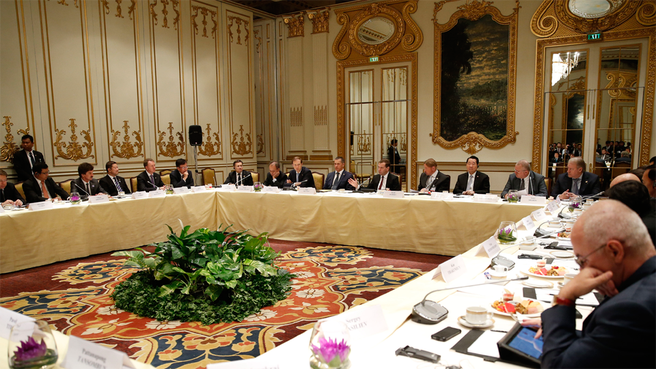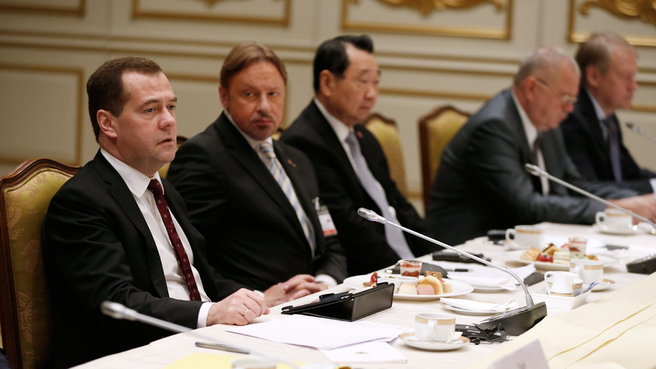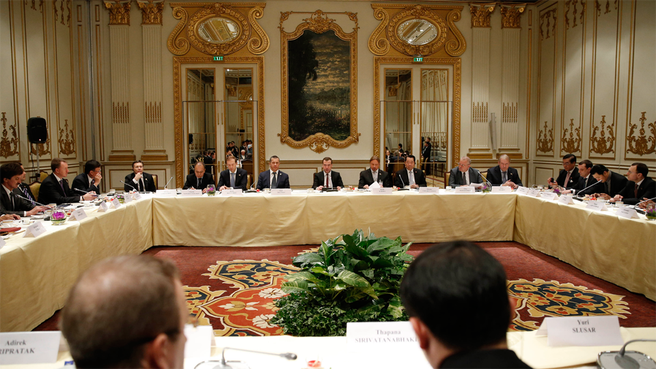Dmitry Medvedev’s opening remarks:
Good afternoon, ladies and gentlemen, respected colleagues – Russian and Thai – it gives me great pleasure to welcome you here! I am pleased to have this opportunity to meet you.
I would like to say that today is a notable occasion for the history of our relations, as for the first time in recent years we had full-fledged talks with Thai Prime Minister Prayut Chan-o-cha and discussed cooperation in various sectors. I hope that our meeting and conversation will also provide an impetus to business ties and trade and investment cooperation. Such meetings are useful; they help understand what makes business tick, grasp the mood of business circles, outline certain prospects and ask questions if there are any. So let’s exchange our considerations.
As is known, our countries have a special relationship. In two years, we will mark the 120th anniversary of the establishment of diplomatic ties.
Our economic cooperation has, in effect, never been interrupted. Trade turnover in recent years, despite the crisis and all sorts of global economic problems (and our economies, too, are exposed to pressure, in one way or another), has also been growing.
Last year, trade turnover, in our estimate, was $4 billion, and in our Thai partners’ estimate, $5 billion (because they count somewhat differently, using statistics involving supplies of a number of goods via third countries).
In any event, these are positive dynamics. Even despite current problems, we are seeing positive dynamics today as well.
We believe – and I said this to the prime minister earlier today – that we have every chance to increase this indicator to $10 billion through various areas, be it the fuel and energy sectors, agriculture, cooperation in the defence and technology sectors, new technologies or medicine. The potential of the aircraft- and helicopter-building industry and motor industry has not yet been tapped to the full.
Naturally, we are counting on further growth in such an important area of our cooperation as tourism. Thailand is among the most attractive countries for tourists – definitely, for our citizens. Last year, 1.6 million citizens of our country, Russians, visited your country.
However, it is important to understand that competition for tourists is becoming more intense, both for internal and external reasons.
We are developing our tourism — domestic tourism. Currency fluctuations have made long itineraries less attractive. They have become more expensive for a large number of our people, so it is essential to create new interesting, accessible tourist products to ensure growth in this segment.
Russia also seeks to create favourable conditions for our investors. We work continuously to improve the investment climate, remove administrative barriers and provide preferential work conditions in the Russian Far East.
In late March, a new law came into force that establishes special legal arrangements for entrepreneurs working in certain areas. They are called “priority development areas”. These will include a simplified land acquisition procedure, tax breaks and other preferences, and the possibility of applying free economic zone customs regulations, and it will be easier to hire qualified foreign personnel there. Therefore, there are people responsible for this on the official team that is accompanying me during this visit.
Here is Mr Trutnev, the deputy prime minister, who is responsible for the development of the Russian Far East. If you have any questions related to investment in priority development areas, they could be discussed both at this table and later on in a less formal setting. You are welcome.
Today is quite an opportune time for entering the Russian market, especially for companies producing food and consumer goods. There are several reasons for this, including the launch of the Eurasian Economic Union. It is a big market. It may be recalled that it now includes a total of five countries, with a population of about 180 million.
An investment project in Russia makes it possible to ensure sales in the other four countries without additional customs duties. And, of course, it is possible to substitute for import from countries that have backed anti-Russian sanctions. For well-known reasons, niches have emerged on our market, primarily on the food and agricultural markets, and those who can fill them will naturally get additional opportunities.
For example, I can say that our trade relations – to be more precise, the volume of agricultural produce from Thailand to the Russian market has grown by 8.5 percent in a few months. This shows that our restrictions, the embargo that we have imposed on a number of European goods, are working and they are working in favour of goods from other parts of the world, specifically from Southeast Asia, from Thailand.
Some of our colleagues present here today are already involved in the development of Russian agriculture and related industries, in particular the CP Group holding. We also know about the plans of another Thai company, Sutech Engineering, to build a sugar refinery in the Far East.
In agribusiness, we are also ready for the creation of co-production ventures and, of course, for Thai supplies to our market, but at the same time we would like to see reciprocity; so that our grain producers and processors could also supply their products to the Thai market. This would enable us to rectify the imbalance in the bilateral food trade.
We have a joint Russian-Thai commission on bilateral cooperation. Its next plenary session will be held in the summer in Russia. I am confident that today’s meetings will give the commission co-chairs something to add to the session agenda. The Russian section of our commission is led by Denis Manturov, the Minister of Industry and Trade. He is also present at this meeting.
Generally, I would like to emphasise that we are interested in diversifying our trade with Thailand and expanding the export of high-tech products, and, as a matter of fact, international cooperation in this segment is a key condition for its development. We are open to expanding ties with Thailand, other ASEAN states and the Asia Pacific region as a whole.
Obviously, the transition to financial settlements in national currencies – the rouble and the baht – could provide an additional impetus to bilateral ties. We have discussed this issue with the prime minister today. This will make it possible to cut costs and currency risks amid unstable exchange rates and speculative attacks on national currencies, and eventually we will be able to make our goods more competitive on the domestic markets.
I would like to close by wishing you all good
projects and good achievements this year. Also, accept my best wishes ahead of
the traditional Thai New Year. And I hope that we will still have plenty of
opportunities to discuss prospects for our work.














